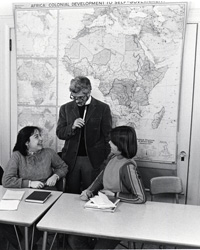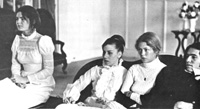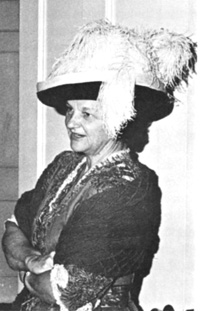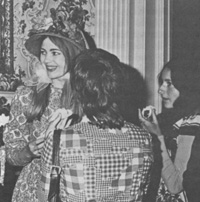The History of Victorian Studies at Vassar College
by Violet Edelman '12
January 2011
Program Website
The study of the Victorian era at Vassar has remained part of the curriculum of the English and History departments since the 1890's. Courses on the 19th century evolved as academic scholarship grew to value the study of Victorian culture. "Victorian Studies" has consisted primarily of those two departments that, historically, have both been strong at Vassar. At its inception, interdisciplinary programs and especially Victorian Studies were newly emerging fields in all of academia as well as at Vassar.
The first Victorian Studies major was arranged through the Independent Program. One of Professor Anthony Wohl's history courses inspired Patricia Leigh Brown, Vassar class of 1976, to pursue the major when she studied an adulterous affair between Charles Wentworth Dilke, a high-profile MP, and Virginia Mary Smith Crawford, the wife of MP Donald Crawford. Under Mr. Wohl's encouragement to delve into primary sources, she read racy accounts of the affair from Victorian Newspapers and found herself enthralled with the period and its culture. Vassar's outstanding collection of 19th century periodicals makes the college a particularly hospitable environment for the study of Victorian England, and the use of primary sources has always occupied a focal point of the program.
For about a decade, students continued pursuing the major through the Independent Program. The major typically involved relevant courses from English and History with a required senior thesis. Complementary courses from Africana Studies, Anthropology, Art, Biology, Economics, Education, Philosophy, and Religion also received credit. Students were also permitted to take courses relating to the 19th century outside of England; from the ethno-history of India to 19th century French courses or Irish literature, many options for courses to enrich a more focused study of Victorian Britain were available.
Victorian Studies became an official interdepartmental program in 1986. Anthony Wohl initiated and oversaw the procedures that severed Victorian Studies from the Independent Program. The interdisciplinary major devised was the only Victorian Studies program in North America leading to an undergraduate degree. Professors Elizabeth Daniels, Beth Darlington and Anthony Wohl constituted the early faculty. The program's original structure has remained in place, with the addition of music in 1998.
A distinguished scholar in the field of Victorian history, Mr. Wohl initially coordinated the program, inspired by the then unique Victorian Studies program for post-graduate students he had taught in at Leicester University in England. According to former students, Mr. Wohl's courses focused on the social and political reform of the period, such as the Reform Bill of 1832, the Corn Laws, the Contagious Diseases Acts, and the Bitter Cry of Outcast London. Victorian Studies alumna Kimberley Quinn remembers, "On day one he held up a puppet of Queen Victoria and announced 'this is the last you will see of her.'" Students have called him "peerless," in both his passionate teaching and his amiable and welcoming demeanor.
From the program's earliest days onward, most Victorian Studies majors have taken their junior year abroad in London, where they formed important relationships with the dominant location of their academic work. Opportunities abroad allowed them to take courses with eminent scholars of the period.
Befitting an interdisciplinary program, faculty introduced an interdisciplinary course in 1979/80 that proved popular with both Victorian Studies majors and others, “The Victorian Wife.” Taught by Professors Daniels and Darlington (English) and Wohl (History), it examined the roles of wifehood in Victorian England; it looked at the fragile legal status of married women, especially concerning property rights, child custody, and divorce, the role of the “ideal wife” set forth by Victorian literature and etiquette manuals, and the changing position of women in these areas through the century. Political Science Professor Mary (Molly) Shanley conducted a class session on marriage law reform in Victorian England. She remembers, “The course offered the participating faculty a wonderful opportunity to work across disciplines, and also to integrate our research interests and our teaching.” Professor Shanley’s book, "Feminism, Marriage and the Law in Victorian England" (Princeton, 1989) proved integral in the teaching of the course. The other required texts ranged from parliamentary proceedings to Victorian novels; using primary source material was characteristically important.
In the early 1990's, the program sponsored a course on Sherlock Holmes taught by local Judge Albert Rosenblatt and his wife Julia Rosenblatt, history buffs with a special passion for Sherlock Holmes. In the course, they explored the legal and psychological elements of the Sherlock Holmes stories. They examined Holmes's evidence to see whether it would in fact have passed in its historical legal context and his functioning psychological processes in relation to his setting. By treating Sherlock Holmes' character as a reality, they brought the Victorian setting to life. Students took a great deal from this unconventional approach to the stories that emphasized Victorian law and psychology. Both "Sherlock Holmes" and "The Victorian Wife" were only offered once, but were great successes. Although the program has not sponsored its own courses subsequently, it has always offered opportunities for independent study to its majors.
Majors in the program have written theses on a wide range of topics, always interdisciplinary in nature, that speak to different elements of the multi-faceted period. They have covered topics such as the first famous female journalist, Elizabeth Lynn Linton (Patricia Leigh Brown, 1976), Consumption (K.A.S. Quinn, 1982), changing representations of fallen women in literature throughout the century (Jennifer Brody, 1987), poets Katherine Bradley and Edith Cooper– the women who wrote under the pseudonym, Michael Field (Daisy Moore, 1991), women's self-education and governesses (Ellen Keith, 1990), Thomas Hardy and Landscape (Michael Fanuele, 1994), the Promethean archetypes in the literature of Joseph Conrad and H.G. Wells (Chay Costello, 1997) and Isabella Bird Bishop's life (Ruth Carver, 2005).
As an interdisciplinary program, the major provides a unique view into a culture, attempting to impart an understanding of a complex people and their world upon its students. Former student Maeve Butler (1991) writes:
Choosing an inter-disciplinary major seemed a license to be as greedy as one wished in mashing together as many different ideas as could possibly, and sometimes not so possibly, be held in one brain. It was an embarrassment of riches, a wild encouragement to draw from many sources and the Victorians themselves were no help in narrowing the focus - all these writers were profoundly interested in exploring aesthetic questions in essays and in fiction, painters who wrote, psychologists who photographed their subjects in poses mirroring the gestural language of the theater of their times and the collision of it all in what became my primary interest which was the fascination with and depiction of actresses in Victorian novels. The actresses, and the way the writers portrayed them, gave me entrance into one of my favorite Victorian aesthetic questions - is art a subjective or objective mirror? What's real? The use of those actresses in those novels was the definition of multidisciplinary exploration of a topic.
The program approached the study of this fertile time in a way that befitted the feeling of its people, navigating a path through the maze of 19th century culture by approaching it from different disciplinary perspectives. Chay Costello (1997) writes of her multidisciplinary education, "The separate parts worked together to form a whole that felt vital and alive, multi dimensional, through the multiple disciplines." Looking at one topic through such a multiplicity of lenses encouraged students to form their own opinions in their own voices from the synthesis of different perspectives; Jennifer Brody (1987) remembers, "Vassar encouraged me to do lots of research, to develop my own perspective and a vast array of texts and to write with verve and my own voice."
In this way, as Michael Fanuele says, "It was a fantastic training for professional work." To answer the familiar question which Victorian Studies students find themselves continually confronted with– "And what are you going to DO with that?"– Vassar's Victorian Studies majors have graduated to pursue a wide range of professions that relate, if even indirectly, to their study of the Victorian era. From publishing The Spectator and writing historical fiction novels about Queen Victoria for "young adults" (K.A.S. Quinn, 1982), to writing for the New York Times (Patricia Leigh Brown, 1976), to working in advertising (Michael Fanuele, 1994), to exploring new ways of cataloguing texts that fall into interdisciplinary fields in libraries (Margaret Dull, 2005), majors throughout the years have found careers inspired in some way by their undergraduate work, which taught them methods of acquiring multi-layered understandings of people, their setting, and their culture.
As a small program, Victorian Studies has had the great advantage that majors get to know each other intimately and enjoy a close academic and social rapport with faculty. Looking back, Anthony Wohl reflects, "It was always highly selective, attracting excellent students. It prided itself on quality rather than quantity of majors….The faculty, as well as the students, learned from one another." Small size facilitated close relationships within the program, and faculty and students alike celebrated the eccentricity of their study. Mr. Wohl continues, "Victorian teas (to which the students often came dressed in remarkably authentic Victorian garb), with recipes from Mrs. Beeton's cookbook, and dramatic readings and a fine end-of-semester dinner were all integral parts of the programme. These occasions revealed, as much as did the obligatory Senior Thesis, how thoroughly the students were immersed in the Victorian world: they lived, thought, and indeed ate, like Victorians!"
Former students emphatically reaffirm this. Patricia Leigh Brown remembers:
Every year at Christmastime, the small coterie of Victorian Studies majors were invited over to Betty Daniels' house to cook and steam a Christmas pudding out of Mrs. Beeton's Book of Household Management. We followed the recipe to the T, and it took forever. The resulting delicacy had the approximate shape and density of a door-stopper. (It probably could have doubled for one.) Under ordinary circumstances, I probably would have avoided such a dessert. But in Betty's kitchen, it always tasted delicious.
In the early 90's, dining together became an annual tradition. Today, the members of the program have a formal dinner every spring, which features an elaborate dinner always finished with trifle and often complemented with music from collections of Victorian parlor songs. The program has also hosted Gilbert and Sullivan nights, teas, and play readings. Through the years, Victorian Studies events have remained one of the most memorable elements of the program for its participants; majors have always treasured having the chance to socialize with the eclectic group of professors and to engage in intellectual discussions often, but not necessarily, related to the 19th century. Students have chosen the major for the intriguing and complex subject matters that arise through the study of the period, but also to work with the outstanding professors at Vassar who have taught those subject matters; past and present students alike consistently agree that learning this extraordinary material from such extraordinary scholars creates a unique academic experience.
Many thanks to Professor Beth Darlington, who guided me through the processes of researching, writing, and rewriting this piece– I could not have produced this history without the invaluable time and energy she devoted to the project. My appreciation also to Professor Betty Daniels for all her advice.
Sources
- Interviews with Maeve Butler, Jennifer Brody, Patricia Leigh Brown, Chay Costello, Ruth Carver, Margaret Dull, Michael Fanuele, Matthew Hackett, Ellen Keith, Tani Mauriello, Daisy Moore, Kimberly Quinn, and Tony Wohl.
- An Administrative History of Vassar College, 1861-2003; edited by Ronald D. Patkus and Elizabeth A.Daniels, written by Karilyn B. Strickland and Marian Thomas, 2004.




